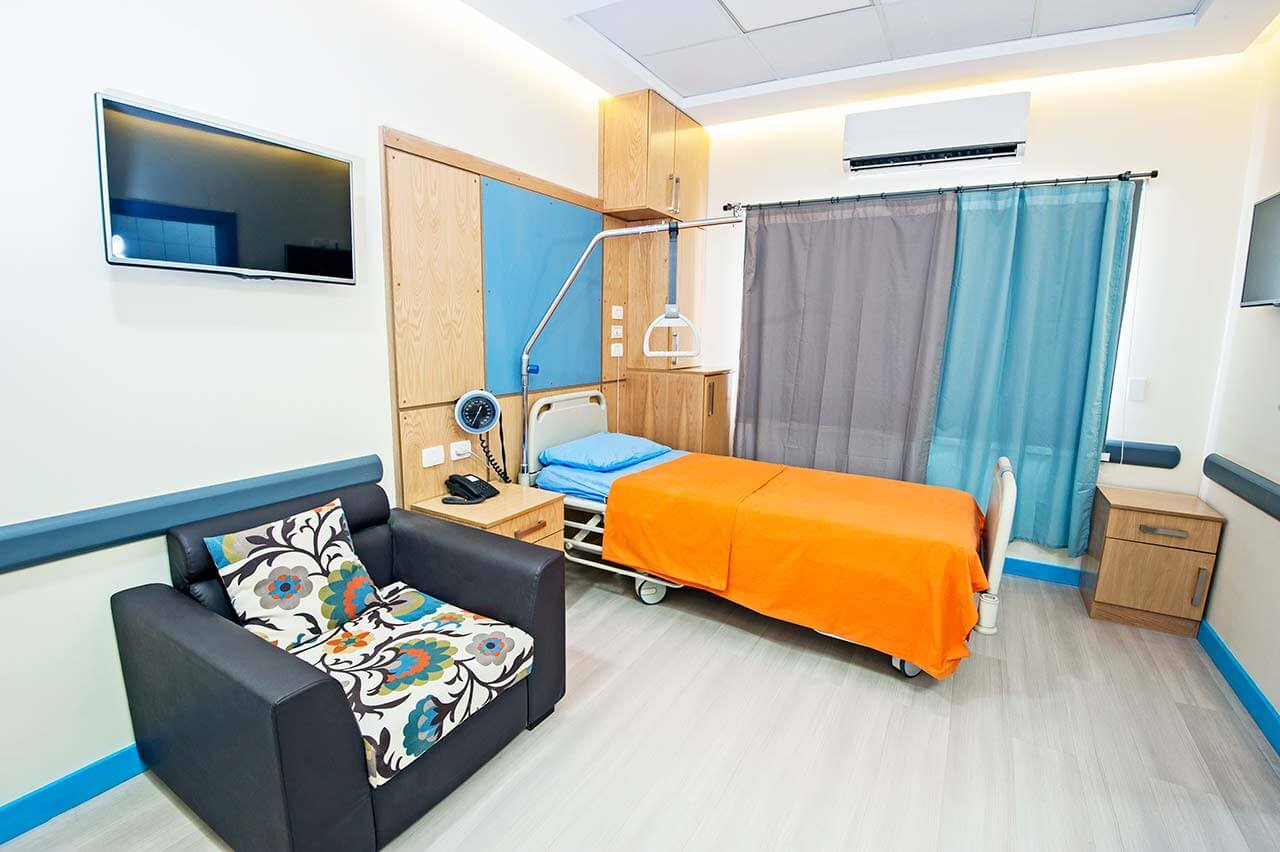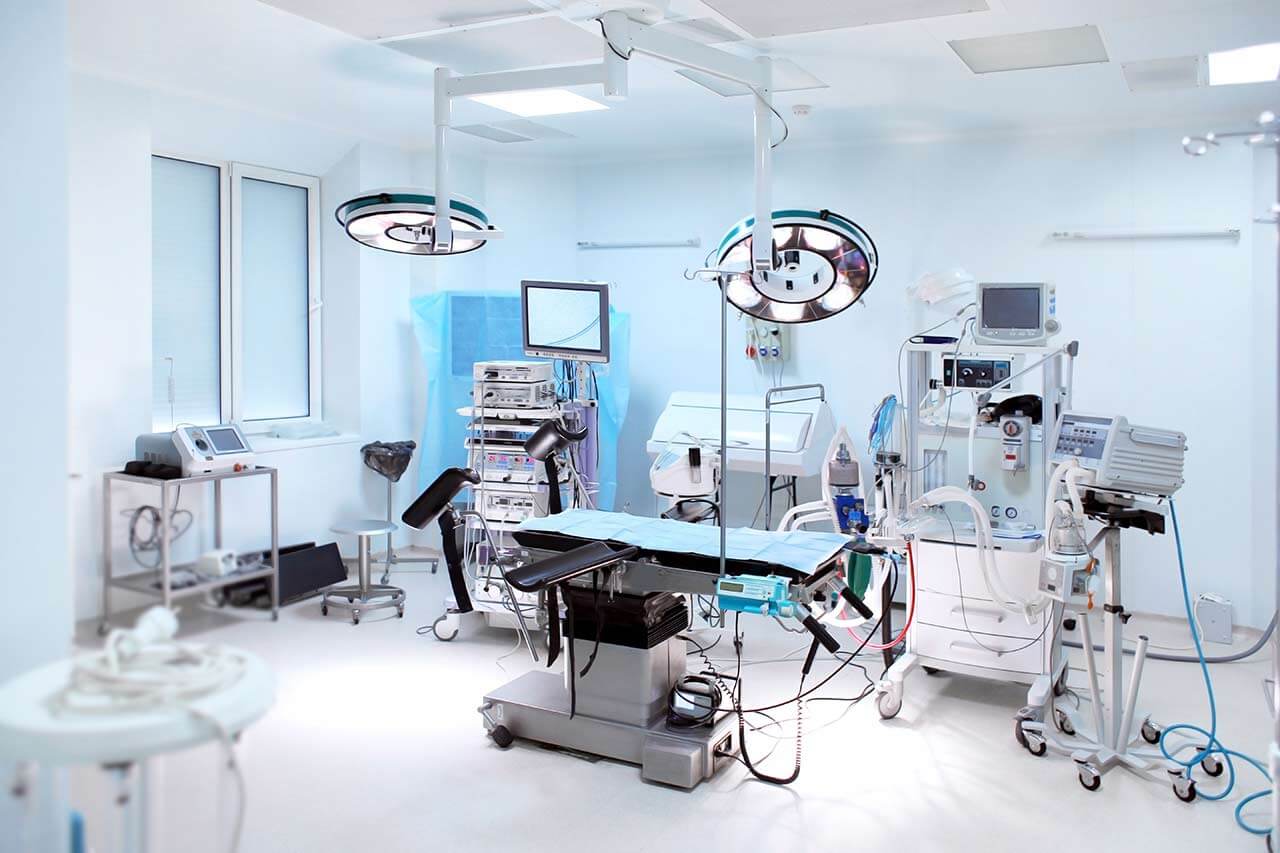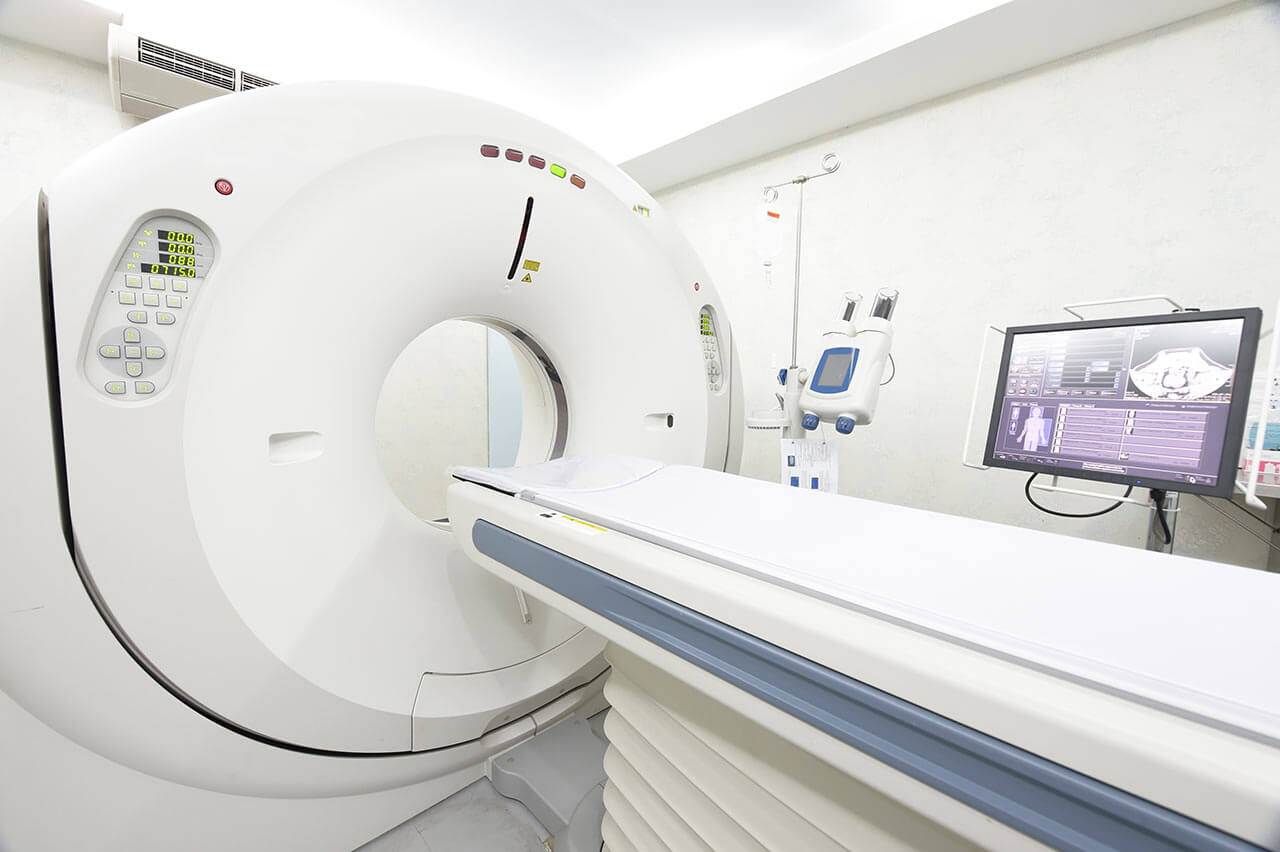
The program includes:
- Initial presentation in the clinic
- clinical history taking
- review of medical records
- physical examination
- laboratory tests:
- complete blood count
- general urine analysis
- biochemical analysis of blood
- TSH-basal, fT3, fT4
- tumor markers
- indicators of inflammation
- indicators of blood coagulation
- CT planning of radiation therapy
- full course of conventional radiation therapy
- nursing services
- explanation of future recommendations
How program is carried out
During the first visit, the doctor will conduct a clinical examination and go through the results of previous laboratory tests and instrumental examinations. After that, you will undergo an additional examination, including complete blood count, laboratory assessment of liver and kidney function. Based on the received results, the physician will conduct radiotherapy planning with the help of CT or MRI, make the permanent tattoo marks on the skin and conduct CT simulation in order to assess the accuracy of the rays and the radiation dose. If necessary, related medical specialists will be involved in the elaboration of a treatment regimen (tumor board).
Radiation therapy is carried out as the day hospital procedure, without mandatory admission to the hospital. At each visit, the physician will assess your general condition and the marks on the skin. After that, you will be placed in a shielded radiation therapy room, on a special table.
Each radiation therapy session lasts less than half an hour (including preparation). All this time, doctors and nurses are monitoring your condition, you can communicate with them through a loudspeaker. The procedure is completely painless. Depending on the planned course of treatment, you will visit the hospital from 1 to 3-5 times a week.
After the completion of the radiation therapy course, you will undergo control examinations aimed at assessing your condition and efficacy of treatment. After that you will receive the medical report with detailed recommendations regarding further follow-up and treatment. In the future, you will be able to have a distant consultation with your attending physician and schedule the next course of treatment, if necessary.
Required documents
- Medical records
- MRI/CT scan (not older than 3 months)
Service
You may also book:
 BookingHealth Price from:
BookingHealth Price from:
About the department
The Department of Radiation Therapy, Radiation Oncology and Proton Therapy at the University Hospital Carl Gustav Carus Dresden offers the full range of modern radiation therapy at the highest medical and technological level. Innovative proton therapy is also within the competence of the medical facility. As the largest medical facility of this kind in Eastern Saxony, the department annually admits about 2,300 cancer patients, 550 of whom are treated on an inpatient basis. In total, the department has about 110 employees, including 26 doctors, 14 physicists, 22 radiological assistants, 22 nurses and 28 employees of various profiles (in radiation biology research laboratories and other sections). The department's doctors cooperate closely with oncologists, chemotherapists and other specialists in related fields, since cancer patients usually require comprehensive treatment that combines several methods. In most cases, patients undergo radiation therapy on an outpatient basis, which eliminates the need for hospitalization. The main value of the department's medical team is the patient's health, so doctors always strive to provide qualified medical care that meets the individual needs of the patient.
The department is headed by Prof. Dr. med. Mechthild Krause. The doctor is one of the leading European experts in proton and photon therapy. She has vast clinical experience and saved thousands of lives of cancer patients.
Сombined treatment with radiation therapy and chemotherapy is carried out on an inpatient basis. Prostate and breast tumors, as well as brain tumors are most often treated on an outpatient basis. The outpatient treatment partially takes place in the Section of Radiation Therapy located at the Medical Care Center (MVZ). State-of-the-art medical equipment and the introduction of the very latest medical advances ensure the use of optimal treatment programs and radiation technologies. The specialists involved in the treatment process set themselves the goal of choosing an individually adapted treatment for each patient, taking into account all his wishes and needs. The department cooperates closely with related departments at the hospital, including the University Cancer Center and the Center for Innovation Competence in Medical Radiation Research in Oncology ("OncoRay").
The therapeutic process begins with an individual consultation with a radiation therapist, who studies the patient's medical history, listens to his complaints, and then prescribes the necessary diagnostic tests to assess the advisability of radiation therapy and determine the optimal type of irradiation. With the appropriate clinical indications for radiation therapy, planning of the forthcoming irradiation begins. The planning phase of radiation therapy involves the use of various imaging techniques: X-ray, computed tomography, magnetic resonance imaging, and positron emission tomography. The images obtained allow the doctor to clearly identify the irradiation zones and adjacent anatomical structures that need to be protected from harmful effects. The optimal duration of irradiation and the required number of radiation therapy sessions are also calculated to reduce the size of the tumor or to completely destroy it. It should be noted that radiation therapy is completely painless. During the first few weeks after the completion of the course of radiation therapy, the patient may experience certain side effects, but they are usually mild and, if necessary, can be easily eliminated with the help of symptomatic medications.
An important area of the department's clinical activity is proton therapy. Since 2014, the department has been operating a specialized Proton Therapy Unit, which offers patients innovative and most sparing radiation technologies. Proton therapy is distinguished by its exceptional irradiation precision and is now widely recognized internationally. This type of therapy is most effective in the treatment of soft tissue and bone tumors (for example, chordomas, chondrosarcomas), many tumors in children, especially brain and salivary gland tumors (in particular, adenoid cystic carcinoma), tumors located in the immediate vicinity of critically important organs, such as skull base or spinal cord, as well as eye tumors.
The department specializes in the following types of radiation therapy:
- External beam radiation therapy
- 3D conformal radiation therapy
- Intensity modulated radiation therapy
- Image-guided radiation therapy
- Tomotherapy
- Intraoperative radiation therapy
- Contact radiation therapy
- Brachytherapy
- Afterloading therapy
- Selective internal radiation therapy (SIRT)
- Stereotactic radiosurgery
- Proton therapy
- Other treatment methods
Curriculum vitae
University Education and Qualifications
- 1994 - 2000 Study of Medicine at the Dresden University of Technology.
- 2002 Doctor of Medicine, Department of Radiation Oncology, Dresden University of Technology.
- 12.2007 Venia Legendi, Dresden University of Technology.
- 02.2008 Assistant Professor, Dresden University of Technology.
- 07.2013 Professor for Translational Radiation Oncology.
Main Professional Interests
- Brain tumors.
- Breast tumors.
Postgraduate Training
- 2000 - 2001 Postdoctoral Fellowship, Radiobiology Laboratory, Department of Radiation Oncology, University Hospital Carl Gustav Carus Dresden, TU Dresden.
- 2001 - 2006 Clinical Residency, Department of Radiation Oncology, University Hospital Carl Gustav Carus Dresden.
Medical Career
- 2006 Consulting Physician, Department of Radiation Oncology, University Hospital Carl Gustav Carus Dresden.
- Since 2007 Specialized Physician responsible for breast, brain and gynecologic cancers.
- Since 2013 Specialized Physician responsible for clinical and translational research and treatment of brain tumors.
- Since 2016 Head of the Department of Radiation Therapy, Radiation Oncology and Proton Therapy, University Hospital Carl Gustav Carus Dresden.
Research Career
- 2007 Team Leader, "Radiobiology and Experimental Tumor Radiation Therapy", Visiting Specialist, Princess Margaret Hospital, University of Toronto.
- Since 2009 Senior Physician responsible for breast, brain and gynecologic cancers.
- Since 2012 Acting Head of the Department of Radiation Therapy, Radiation Oncology and Proton Therapy, University Hospital Carl Gustav Carus Dresden.
- Since 2013 Full Professor for Translational Radiation Research.
Research Interests
- Biological individualization of radiation therapy.
- Assessment of particle beam radiation therapy.
Memberships in Scientific Societies
- European Society for Therapeutic Radiology and Oncology (ESTRO) – Member of the Clinical Committee.
- German Society for Radiation Oncology (DEGRO).
Titles and Awards
- 2002 Carl Gustav Carus Prize of the Dresden University of Technology.
- 2005 VARIAN Prize – Juliana Denekamp of the European Society for Therapeutic Radiology and Oncology (ESTRO).
- 2009 Hermann Holthusen Prize of the German Society for Radiation Oncology (DEGRO).
Photo: (с) depositphotos
About hospital
According to the reputable Focus magazine, the University Hospital Carl Gustav Carus Dresden ranks among the top five German hospitals!
The hospital is the benchmark for modern high-quality medicine. Positioning itself as a maximum care medical facility, the hospital represents all medical fields. There are 26 specialized departments, 6 institutes and 17 interdisciplinary centers, which cooperate closely with the clinical and scientific facilities of the Faculty of Medicine. The basis of successful practice is excellent equipment, which is regularly updated, as well as highly qualified, experienced medical personnel: world famous doctors and professors work here for the benefit of patients.
In addition to its main goal of caring for patients, the hospital is also active in training and professional development of medical personnel, as well as in the field of public health care. The priority focus of the work is research activity, which allows the doctors to introduce the innovative diagnostic and therapeutic techniques into clinical practice.
A special feature of the hospital is also the diagnostics and treatment of rare diseases. State-of-the-art equipment and well-coordinated work of doctors of various medical specialties make it possible to timely recognize pathologies rarely encountered in medical practice and select the most effective therapy. Specialization in rare diseases include neurology, endocrinology, hematology/oncology, and rare autoimmune diseases.
The hospital has 1,410 beds for patient hospitalization. About 55,900 inpatients and more than 233,975 outpatients undergo treatment here annually. A large medical team, consisting of about 1,000 highly qualified doctors, as well as over 2,000 nursing staff take care of the patients' health. Each patient is guaranteed an individual approach and the most effective treatment in accordance with current clinical protocols.
It should be noted that the university hospital enjoys an impeccable reputation not only in Germany, but also far beyond its borders, including Arab countries, post-Soviet states, Great Britain and the United States. Patients from different parts of the world come here for high-quality treatment for diseases of any severity. The highest credit of patient confidence is the main indicator of the fruitful work of doctors.
Photo: (с) depositphotos
Accommodation in hospital
Patients rooms
The patients of the University Hospital Carl Gustav Carus Dresden live in comfortable rooms made in bright colors and equipped with everything necessary. The standard patient room includes an automatically adjustable bed, a bedside table with a sliding table, a wardrobe, a telephone and a TV. There is also Wi-Fi (free) in the patient rooms.
If desired, patients may live in enhanced comfort patient rooms. These patient rooms have a more sophisticated design, upholstered furniture and a safe for storing valuables.
Meals and Menus
The patients of the hospital are offered a tasty, healthy and varied three meals a day. The menu is based on local cuisine and seasonal food. If you for some reason do not eat certain products, please inform the medical staff of the hospital in advance, and you will be offered an individual menu. The nutrition provided in the hospital is certified in accordance with the quality standards of the German Nutrition Society (DGE) for catering in German hospitals.
Further details
Standard rooms include:
Religion
The religious services are available upon request.
Accompanying person
Your accompanying person may stay with you in your patient room or at the hotel of your choice during the inpatient program.
Hotel
You may stay at the hotel of your choice during the outpatient program. Our managers will support you for selecting the best option.
The hospital offers a full range of laboratory diagnostic procedures (general, hormonal, tests for tumor markers, infections, antibodies, etc.), genetic tests, various modifications of ultrasound scans, CT scans, MRI and PET / CT, angiography, myelography, biopsy and other examinations. Treatment with medications, endoscopic and robotic operations, stereotaxic interventions is carried out here, modern types of radiation therapy are also used. The hospital offers patients all the necessary therapeutic techniques.
- Cochlear implantation
- Deep brain stimulation
- Treatment of benign prostatic hyperplasia with green laser
- Da Vinci prostatectomy
- Bone marrow transplantation
These are head and neck tumors, hearloss, amyotrophic lateral sclerosis, epilepsy, Parkinson disease, infertility, malignant tumors of the reproductive system, congenital anomalies of the genital organs and the urinary system, urinary incontinence, blood clotting disorders, leukemia and other pathologies.
- Otolaryngology (Center for Cochlear Implantation)
- Neurology and Epileptology
- Urology
- Oncology
- Gastroenterology and Hepatology
About 1,000 highly qualified doctors work at the hospital.





